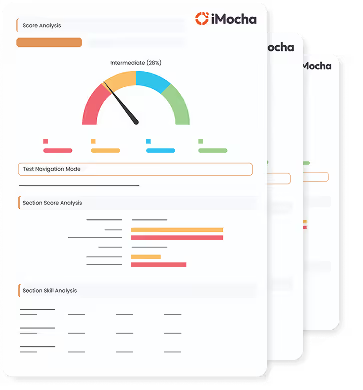


Choose easy, medium, or tricky questions from our skill libraries to assess candidates of different experience levels.
Choose easy, medium, or tricky questions from our skill libraries to assess candidates of different experience levels.

Choose easy, medium, or tricky questions from our skill libraries to assess candidates of different experience levels.

Choose easy, medium, or tricky questions from our skill libraries to assess candidates of different experience levels.
This a comprehensive PDF report, which you can instantly download and share with your hiring team or candidates for seamless collaboration.
Download Sample Report



iMocha’s insurance broker test is the ideal pre-hire test for recruiters and hiring managers to assess candidates objectively. This test helps hire Insurance Brokers and helps to reduce hiring time by 45%.





%20(1).webp)
Insurance brokers act as intermediaries between clients, individuals or commercial businesses, organizations, and insurance companies. Typical employers of insurance brokers include large and small brokerages, financial advice companies, Insurance or reinsurance companies, and Insurance risk management departments.
They use their in-depth knowledge of risks and the insurance market to find and arrange suitable insurance policies and cover. They act in the interest of their clients and offer products from more than one insurer to ensure that their clients get the best deal.
Their primary tasks include:
KEY SKILLS REQUIRED:

VERBAL ABILITY
Verbal Ability is essential because grammar and vocabulary are prerequisites for good spoken and written English.
VERBAL REASONING
Reading comprehension indicates an ability to comprehend and reason with the concepts on a written page.
QUANTITATIVE APTITUDE
Quantitative Ability will indicate analytical thinking and problem-solving Ability.
LOGICAL REASONING
Logical Reasoning is assessed through
These questions will indicate the quality of deductive Reasoning and inductive Reasoning, which contribute to Critical thinking ability.
ABSTRACT REASONING
Abstract Reasoning will indicate the ability to think, identify logical patterns, learn new skills, and solve complex problems. It is an indicator of fluid intelligence and shows an ability to strategize.
The insurance broker online test may contain MCQs (Multiple Choice Questions), MAQs (Multiple Answer Questions), Fill in the Blanks, Whiteboard Questions, Audio / Video Questions, True or False Questions, etc.
Test Details: 46 Questions, 60 minutes







.webp)
.webp)
.webp)
.webp)